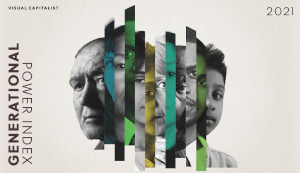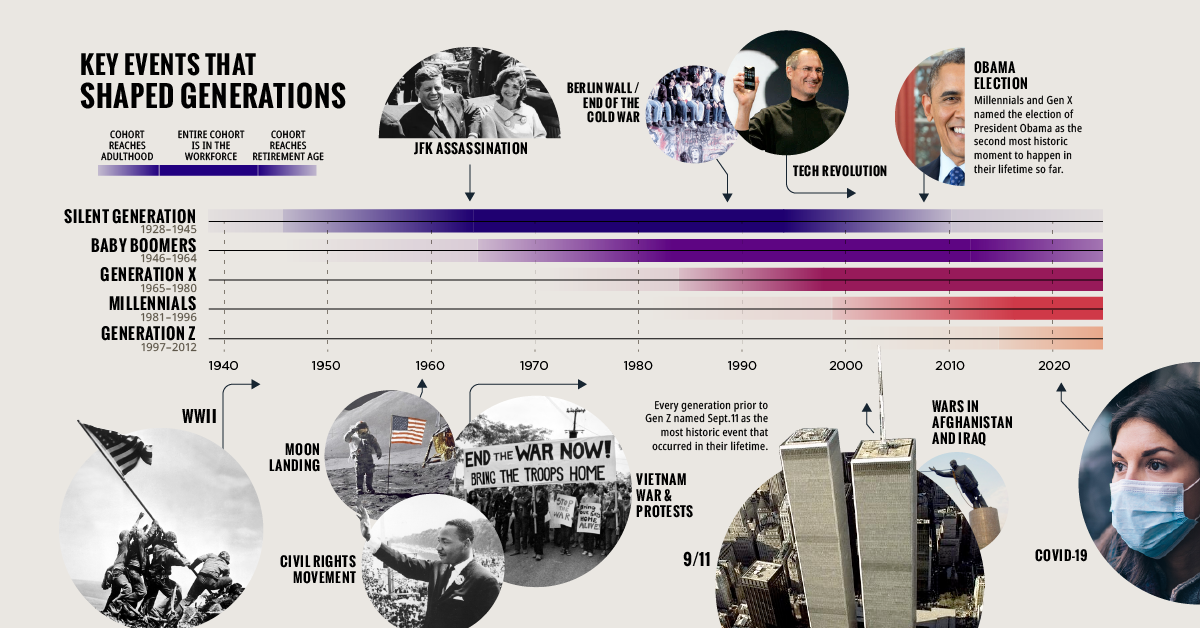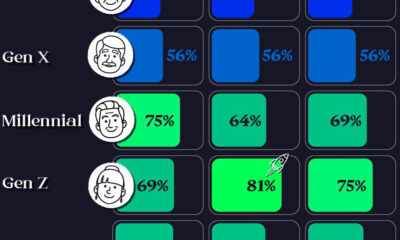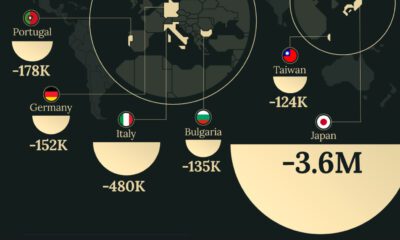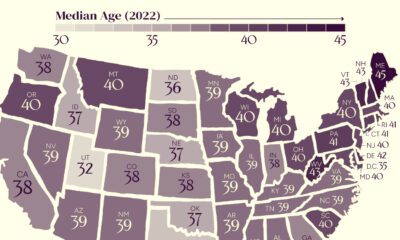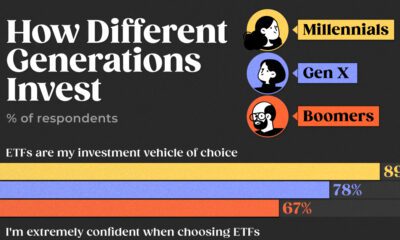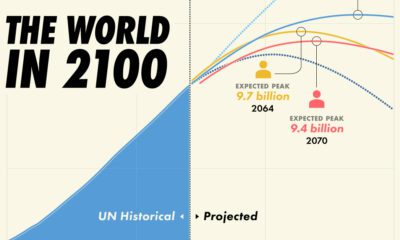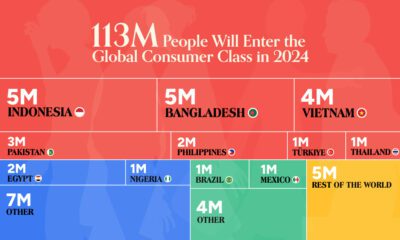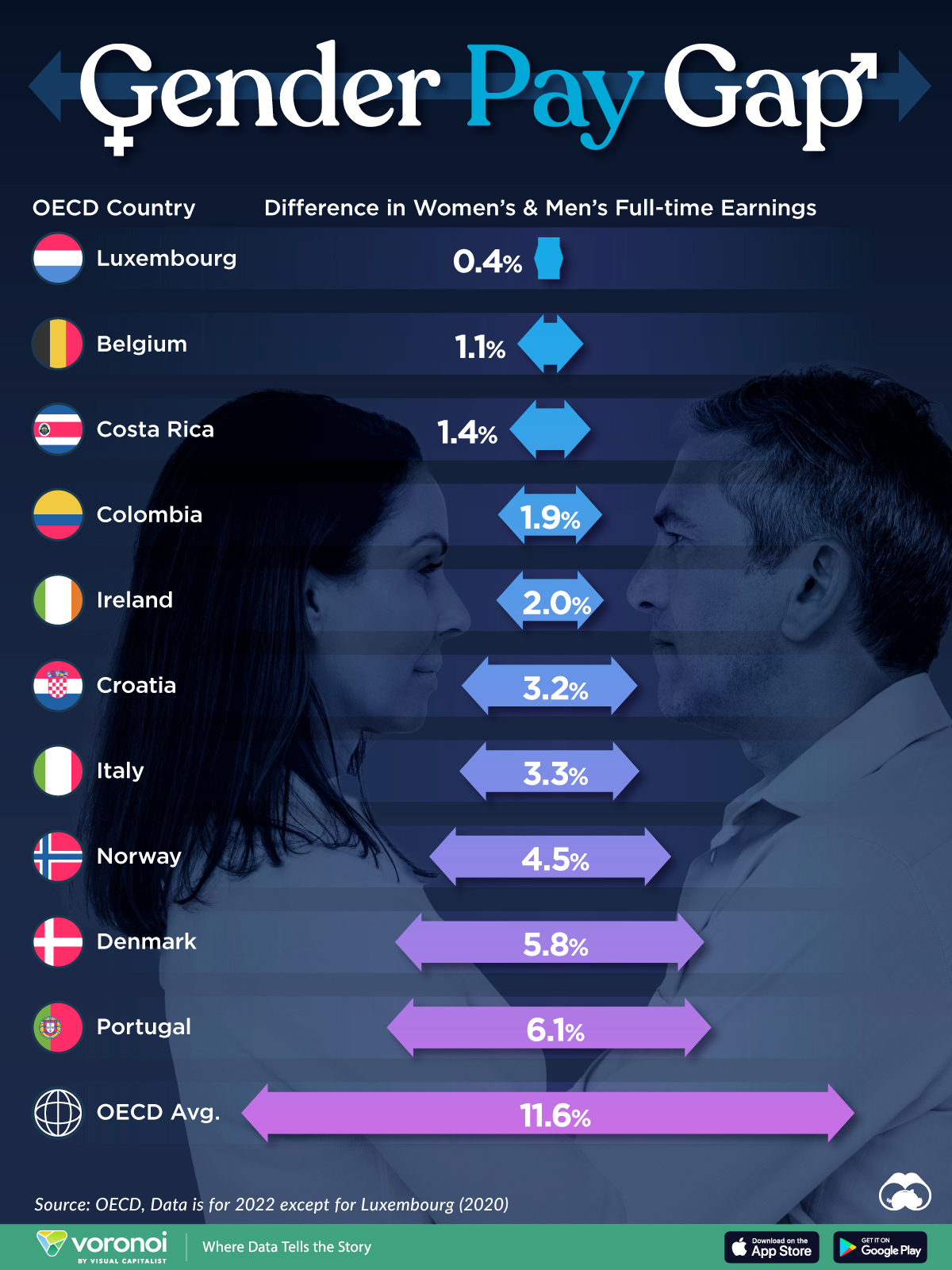Demographics
Timeline: Key Events in U.S. History that Defined Generations
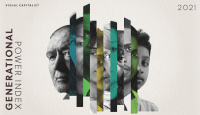
Introducing our new index, which ranks U.S. generations on their economic, political, and cultural influence.
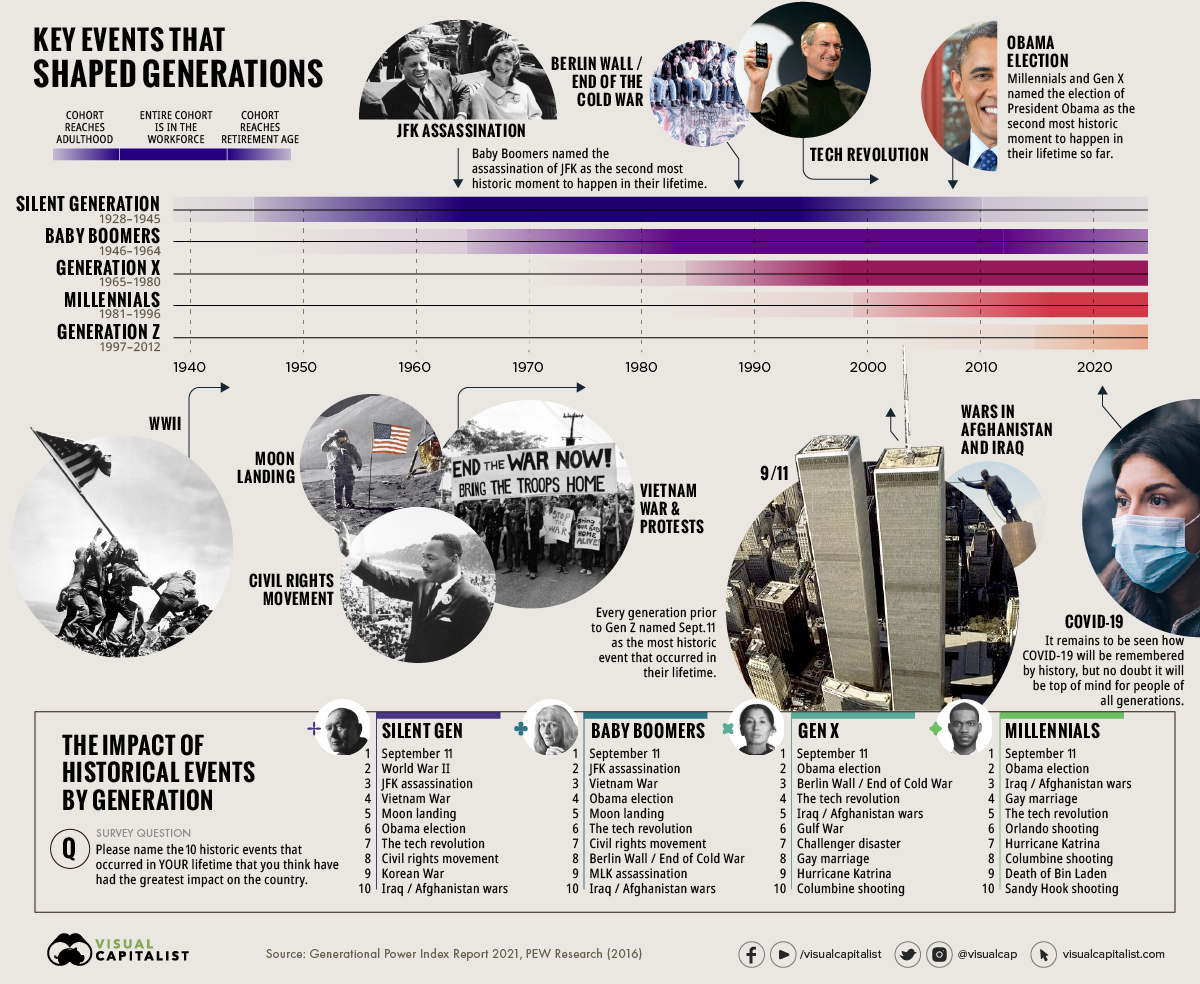
Key Events in U.S. History that Defined Generations
Looking back at history is a necessity when trying to understand what the future may hold.
Using insights from our Generational Power Index 2021 report, along with survey data from Pew Research in 2016, we identified some key milestones for each cohort, to understand how these events helped shape each generation’s unique perspectives.
Quick Context on Generational Definitions
Before diving in, it’s important to clarify which generations we’ve included in our research, along with their age and birth year ranges.
| Generation | Age range (years) | Birth year range |
|---|---|---|
| The Silent Generation | 76 and over | 1928-1945 |
| Baby Boomers | 57-75 | 1946-1964 |
| Gen X | 41-56 | 1965-1980 |
| Millennials | 25-40 | 1981-1996 |
| Gen Z | 9-24 | 1997-2012 |
| Gen Alpha | 8 and below | 2013-present |
These generational categories aren’t universal, but we went with the most widely cited definitions from reputable U.S. sources including the Pew Research and the U.S. Federal Reserve. It’s also worth noting that these generational definitions are somewhat specific to North America. For this reason, the focus is on U.S. historic events.
Defining Events: Silent Generation
The oldest members of the Silent Generation were 11 years old at the start of World War II, and were teenagers by the time it ended. In other words, their formative years fell smack dab in the middle of one of the biggest international conflicts in modern history.
Because of this, it makes sense that World War II ranks as the second most impactful event in their lifetimes, trailing only the far more recent Sept. 11 terrorist attacks (2001).
Most Impactful Historic Events, Silent Gen (Survey Results)
| Rank | Silent Gen | Survey % |
|---|---|---|
| #1 | Sept. 11 | 59% |
| #2 | WWII | 44% |
| #3 | JFK Assassination | 41% |
| #4 | Vietnam War | 37% |
| #5 | Moon landing | 29% |
| #6 | Obama election | 28% |
| #7 | The tech revolution | 27% |
| #8 | Civil rights movement | 18% |
| #9 | Korean War | 18% |
| #10 | Iraq/Afghanistan wars | 14% |
In fact, the Silent Generation cited four different wars on their list, more than any other cohort. For context, Boomers identified three conflicts (including the Cold War), while Millennials only referenced one (Iraq/Afghanistan).
Of course, other not-so-violent events made the list as well. And interestingly, some of these impressionable moments occurred later on in life.
For example, the youngest members of The Silent Generation were already in their mid-t0-late forties when cellphones became common in the ‘90s—yet, 27% identified the tech revolution as one of the top 10 most impactful events that happened in their lifetime.
Clearly, life never stops throwing you curve balls—no matter how far along you might be.
Most Notable Historical Events: Baby Boomers
Many of the historical experiences cited by Baby Boomers were related to war and violent acts. For instance, Boomers identified two assassinations on their list—John F. Kennedy’s in 1963, and Martin Luther King’s in 1968.
Most Impactful Historic Events, Boomers (Survey Results)
| Rank | Baby Boomers | Survey % |
|---|---|---|
| #1 | Sept. 11 | 70% |
| #2 | JFK Assassination | 45% |
| #3 | Vietnam War | 41% |
| #4 | Obama election | 38% |
| #5 | Moon landing | 35% |
| #6 | The tech revolution | 26% |
| #7 | Civil rights movement | 18% |
| #8 | Fall of Berlin Wall/end of Cold War | 16% |
| #9 | MLK assassination | 15% |
| #10 | Iraq/Afghanistan wars | 11% |
For this generation, the moon landing in 1969 made the cut, as did Barack Obama’s election win in 2008.
Baby Boomers only identified one event that was unique to their cohort (Martin Luther King’s death). It’s worth noting that responses varied between Americans of different racial backgrounds. Not surprisingly, Black Americans were far more likely to name MLK’s death as a top defining moment.
Most Notable Historical Events: Gen X
For Gen Xers, two unique events made their list: the Challenger disaster (1986) and the Gulf War (1991). Interestingly, neither of of these events stood out for other generations.
The Challenger disaster impact was widely felt because it involved civilians alongside astronauts, making the space shuttle’s explosion all the more notorious.
Most Impactful Historic Events, Gen Xers (Survey Results)
| Rank | Gen X | Survey % |
|---|---|---|
| #1 | Sept. 11 | 79% |
| #2 | Obama election | 40% |
| #3 | Fall of Berlin Wall/end of Cold War | 21% |
| #4 | The tech revolution | 20% |
| #5 | Iraq/Afghanistan wars | 18% |
| #6 | Gulf War | 15% |
| #7 | Challenger disaster | 14% |
| #8 | Gay marriage | 10% |
| #9 | Hurricane Katrina | 10% |
| #10 | Columbine shooting | 9% |
| #11 | Orlando shooting | 9% |
| #12 | Oklahoma City bombing | 9% |
Hurricane Katrina (which occurred in 2005) is the only natural disaster to make it on any of these lists. The hurricane—which caused a significant share of New Orleans’ population to resettle—left a lasting impression on the nation.
Most Notable Historical Events: Millennials
Millennials remember the September 11 attacks the most of all generations, with 86% citing it as their most influential event. They also paid close attention to the aftermath of this occurrence, as marked by the inclusion of both the Iraq/Afghanistan wars and the death of Osama Bin Laden among their most notable events.
Most Impactful Historic Events, Millennials (Survey Results)
| Rank | Millennials | Survey % |
|---|---|---|
| #1 | Sept.11 | 86% |
| #2 | Obama election | 47% |
| #3 | Iraq/Afghanistan wars | 24% |
| #4 | Gay marriage | 19% |
| #5 | The tech revolution | 18% |
| #6 | Orlando shooting | 17% |
| #7 | Hurricane Katrina | 11% |
| #8 | Columbine shooting | 10% |
| #9 | Bin Laden | 10% |
| #10 | Sandy Hook | 7% |
| #11 | Boston Marathon bombing | 7% |
| #12 | Great Recession | 7% |
Sadly, a lot of Millennials recollect instances of gun violence more than any other generation, from Orlando and Columbine to Sandy Hook.
Last but not least, Millennials are the only generation to note the Global Financial Crisis of 2008, and the subsequent Great Recession, as a momentous event. This makes sense considering many of them began their careers in its aftermath.
Gen Z and Younger
The Pew Research survey data was collected in 2016, so opinions on more recent events have not been collected.
That said, it could be premature to say in the short term which events will leave a lasting impression on generations, young and old.
According to the above data, the election of Barack Obama was a lasting milestone in recent history. Will the election of Donald Trump leave a similar impact? How will COVID-19 be regarded in the future? Time will tell which events will define future generations.
Moments, Movements, and Everything in Between
One key takeaway worth emphasizing is just how varied these formative events can be. Some were experienced as a single moment, while others were a culmination of shifts over several years.
It’s also clear that timing and duration are not the only determining factors behind an event’s influence on American society. For example, the moon landing was a tangible moment with a date stamp, whereas the tech revolution has a much fuzzier start (before exploding in significance alongside the Dotcom boom and bust).
Also interesting is what is absent from the top results. For example, the Global Financial Crisis of 2008 is barely referenced.
In short, a variety of impactful events and more gradual revolutions have made their mark on American society. Some have influenced specific generations, while others have transcended generational boundaries and unified the American public.
Download the Generational Power Report (.pdf)
For a full methodology of how we built the Generational Power Index, see pages 28-30 in the report PDF. This is the first year of the report, and any feedback is welcomed.
Demographics
The Smallest Gender Wage Gaps in OECD Countries
Which OECD countries have the smallest gender wage gaps? We look at the 10 countries with gaps lower than the average.
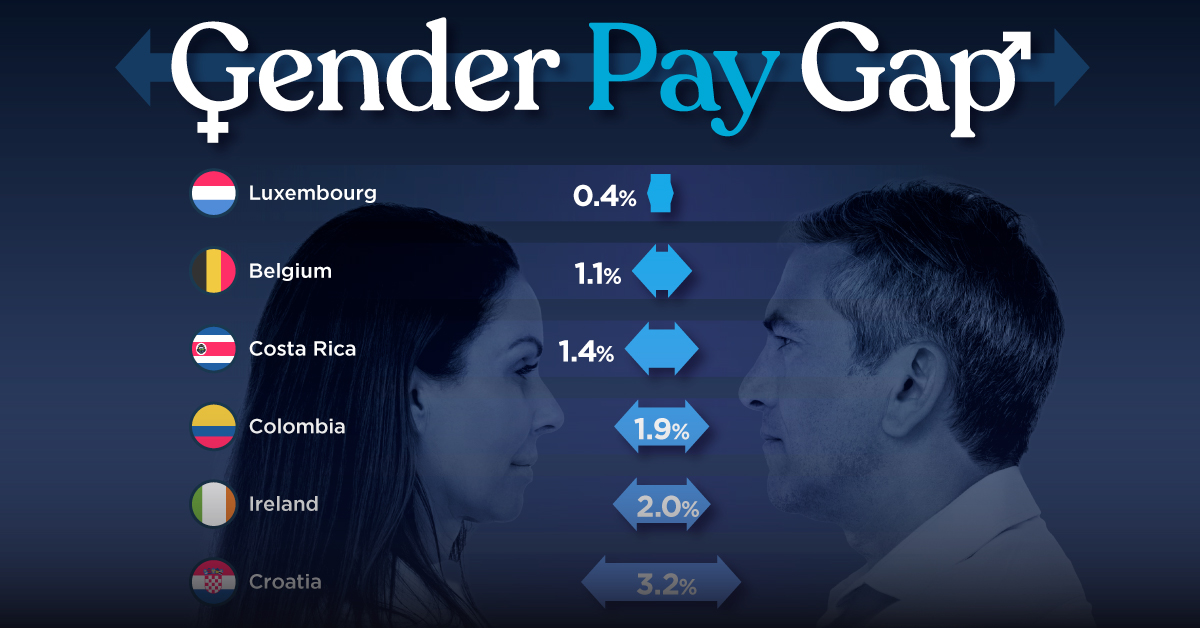
The Smallest Gender Pay Gaps in OECD Countries
This was originally posted on our Voronoi app. Download the app for free on iOS or Android and discover incredible data-driven charts from a variety of trusted sources.
Among the 38 member countries in the Organization for Economic Cooperation and Development (OECD), several have made significant strides in addressing income inequality between men and women.
In this graphic we’ve ranked the OECD countries with the 10 smallest gender pay gaps, using the latest data from the OECD for 2022.
The gender pay gap is calculated as the difference between median full-time earnings for men and women divided by the median full-time earnings of men.
Which Countries Have the Smallest Gender Pay Gaps?
Luxembourg’s gender pay gap is the lowest among OECD members at only 0.4%—well below the OECD average of 11.6%.
| Rank | Country | Percentage Difference in Men's & Women's Full-time Earnings |
|---|---|---|
| 1 | 🇱🇺 Luxembourg | 0.4% |
| 2 | 🇧🇪 Belgium | 1.1% |
| 3 | 🇨🇷 Costa Rica | 1.4% |
| 4 | 🇨🇴 Colombia | 1.9% |
| 5 | 🇮🇪 Ireland | 2.0% |
| 6 | 🇭🇷 Croatia | 3.2% |
| 7 | 🇮🇹 Italy | 3.3% |
| 8 | 🇳🇴 Norway | 4.5% |
| 9 | 🇩🇰 Denmark | 5.8% |
| 10 | 🇵🇹 Portugal | 6.1% |
| OECD Average | 11.6% |
Notably, eight of the top 10 countries with the smallest gender pay gaps are located in Europe, as labor equality laws designed to target gender differences have begun to pay off.
The two other countries that made the list were Costa Rica (1.4%) and Colombia (1.9%), which came in third and fourth place, respectively.
How Did Luxembourg (Nearly) Eliminate its Gender Wage Gap?
Luxembourg’s virtually-non-existent gender wage gap in 2020 can be traced back to its diligent efforts to prioritize equal pay. Since 2016, firms that have not complied with the Labor Code’s equal pay laws have been subjected to penalizing fines ranging from €251 to €25,000.
Higher female education rates also contribute to the diminishing pay gap, with Luxembourg tied for first in the educational attainment rankings of the World Economic Forum’s Global Gender Gap Index Report for 2023.
See More Graphics about Demographics and Money
While these 10 countries are well below the OECD’s average gender pay gap of 11.6%, many OECD member countries including the U.S. are significantly above the average. To see the full list of the top 10 OECD countries with the largest gender pay gaps, check out this visualization.
-
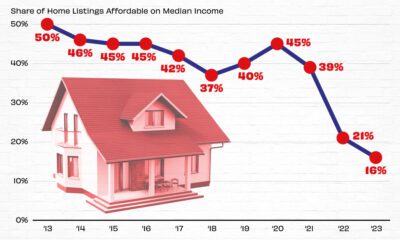
 Real Estate2 weeks ago
Real Estate2 weeks agoVisualizing America’s Shortage of Affordable Homes
-

 Technology1 week ago
Technology1 week agoRanked: Semiconductor Companies by Industry Revenue Share
-

 Money1 week ago
Money1 week agoWhich States Have the Highest Minimum Wage in America?
-

 Real Estate1 week ago
Real Estate1 week agoRanked: The Most Valuable Housing Markets in America
-

 Business2 weeks ago
Business2 weeks agoCharted: Big Four Market Share by S&P 500 Audits
-
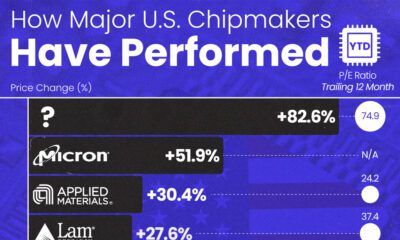
 AI2 weeks ago
AI2 weeks agoThe Stock Performance of U.S. Chipmakers So Far in 2024
-

 Misc2 weeks ago
Misc2 weeks agoAlmost Every EV Stock is Down After Q1 2024
-
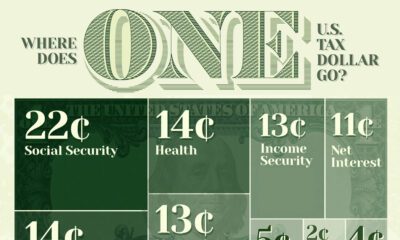
 Money2 weeks ago
Money2 weeks agoWhere Does One U.S. Tax Dollar Go?




